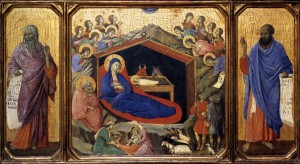How Our Family Keeps Christ in Christmas
 “Actions speak louder than words.” “A picture is worth a thousand words.” “Talk is cheap.” There are many sayings in the English language that generally express the same thing: words alone do not do the necessary job of communicating our thoughts and feelings, especially in the case of a personal message. “I love you,” for instance.
“Actions speak louder than words.” “A picture is worth a thousand words.” “Talk is cheap.” There are many sayings in the English language that generally express the same thing: words alone do not do the necessary job of communicating our thoughts and feelings, especially in the case of a personal message. “I love you,” for instance.
This being so, human beings in every culture have developed rituals to express the value they place on certain people and events. Take, for example, Turkey on the dining room table for Thanksgiving or presents under the tree at Christmas. And then there are birthdays. Even if all party-goers are tone-deaf and the birthday boy is on the Atkins diet, we must sing the silly song and blow out the candles on that carb-laden cake!
The problem with human beings is that we have a stubborn tendency to allow rituals to become mere mechanical actions. We forget the underlying meaning (one of the effects of original sin). The Puritan response to this regrettable tendency was to abolish as many rituals and traditions as possible. For instance, in the state of Massachusetts, dominated by Puritans for so long, Christmas was not an official holiday until the 1890’s!
The Catholic approach has always been different. We accept the human affinity for ritual, with the all the occasional excesses and traditional trappings (even those of pagan origin, such as the Christmas tree). For many centuries, the Church sought to “baptize” pagan ceremonies, investing them with Christian meaning. In the pagan and Greco-Roman world of the fourth century, the winter solstice was widely marked by celebrations. This the Church successfully transformed into Christmas, channeling veneration of the sun into worship of the Son!
So what do we make of the current gift-giving extravaganza of Christmas in America? First let us talk about Christmas morning: though it is Christ’s birthday, the piles of presents under the tree are the real focus, especially for the kids. The first present is opened and then another and another, faster and faster still. It resembles a school of sharks in a feeding frenzy. Almost instantly, the thrill is gone and the room is filled with crumpled wrapping paper.
My wife and I did not want to be Grinches and call off the whole ordeal. So when we started our family, we established some ground rules. On Christmas morning, before we go to the tree, we gather at the manger, sing a carol together, read a short Scripture passage, and thank God for Jesus, the greatest gift of all. Then we go around in a circle, every person opening one present at a time, so that our attention is united and our happiness shared. Saint Paul says “rejoice with those who rejoice and weep with those that weep” (Romans 12:15). Hopefully, we do more of the former than the latter on Christmas morn.
We further restrain the feeding frenzy by recourse to the traditional twelve days of Christmas. We do not open every trinket on the 25th. Rather, we leave some presents wrapped and under the tree for the other 11 days (warning: this takes a good deal of discipline!). That way, every present can be appreciated and the glorious feast can be prolonged.
This D’Ambrosio tradition has generally worked well over the last nineteen years, with a few occasional bugs to work out, of course. Like the time Grandma called one Christmas night and asked our daughter if she enjoyed the gift she had given her. My wife and I were red-faced when she asked, “What gift?” Now we make sure grandparents’ presents are opened first!

